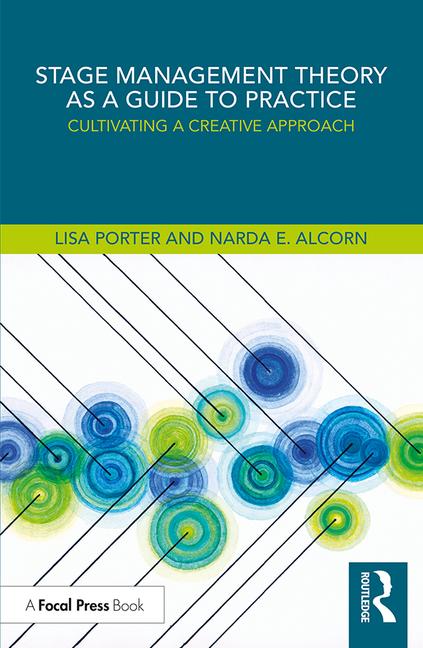
Lisa Porter and Narda Alcorn took some time to answer some questions from TheatreArtLife about their new book, Stage Management Theory as a Guide to Practice. Lisa is the Head of Stage Management at the University of California, San Diego and Narda Alcorn is a professor in the Practice of Stage Management and Chair of the Stage Management Program for the Yale School of Drama.
Over multiple decades of conversation, comparing notes about which theories worked in the classroom and in diverse fields of practice, the idea for the book emerged. Lisa’s spouse, Anders Wright, also our editor, overheard many of these conversations and thought we had unique ideas to offer regarding stage management in the 21st century. In Narda’s case, the nine phases of production stood out as effective theory and Lisa had developed the ‘theory series’ at UC San Diego, including classes such as Collaborative Leadership, Ethics, and Group Dynamics. This book provides a wider audience with access to these effective ideas.
Very much the latter. Our ideas are similar in that we both think theoretically about stage management, however, our approaches are quite different. We hold divergent ideas on almost every topic tackled in the book and the writing process was very much about debating our viewpoints and distilling those ideas. As co-authors, we aspired to offer topics and ideas for the reader, rather than prescribing specific approaches or courses of action. Our very different work backgrounds inform how we view theory. We had lengthy conversations about content and how the experiential stories would connect to the theme in each chapter. Throughout the book, we describe our different approaches in order to promote diverse ways of thinking.
This book is geared towards students and educators, as well as professionals who have been engaged with stage management theory without a systematized framework. The secondary audience includes early career stage management professionals, and anyone who collaborates with stage managers and would like additional insight into working methodology.
Since the book has been published, we have received feedback that collaborators from multiple disciplines could benefit from the techniques and approaches offered in the book. In a recent review in Stage Directions magazine, Sherrice Mojgani writes, “while Stage Management Theory as a Guide to Practice is a great textbook for stage management training programs, its lessons provide concrete leadership skills applicable throughout the theater industry—across all areas and from top to bottom. I recommend it to anyone and everyone who has ever needed to lead a team of collaborators.”

Narda’s favorite chapter is Purpose because it discusses the effectiveness of intentionally practicing one’s values and it lays out an employable system of thought.
Lisa’s favorite is the Culture chapter. This chapter includes ideas that have evolved over decades of working cross culturally and articulates the challenges and also some tactile strategies that have proven to be effective on diverse intercultural projects.
The advice we always give directs students towards the enhanced self-awareness that can come from determining how and why they engage with their work.
Strategies to support this type of engagement include:
There are many facets of a well-rounded stage manager. Specifically, well-rounded stage managers are adept at both hard and soft skills and they are honest with themselves and others about what they don’t know.
Practicing the strategies in the book: identify theories that have meaning, practice distinctly, diagnose the environment, communicate impeccably, orchestrate intentionally, discern cultural diversity wisely, engage ethically, and follow your purpose.
An adaptive approach involves responding uniquely to distinctive production environments and cultures. Adaptive stage managers incorporate perspective, long-term thinking, aesthetic awareness, anticipation, and innovation into their work. They are prepared for the vast and varied scope of process, forge their own path, and ultimately respond to the present moment with care and creativity.
We are encouraging our students to use this time to deepen their commitment to the discipline and refine their expertise. Like the Purpose chapter suggests, one way to do this is to set specific goals and then employ habits in service of those goals. Perhaps this could include something very technical like learning how to use a new software or digital platform or a more abstract engagement with theory like reading a series of books about navigating conflict and giving feedback. Given our current climate, intentionally engaging in questions about racism, identity, and one’s own anti-racist practices can also be a meaningful way to learn and engage while our industry is paused.
TheatreArtLife Celebrates 3 Years: Our Top 10 Articles Since Launch
The Social Distancing Coronavirus Rant


Anna Robb is Co-Founder and Managing Director for TheatreArtLife. Anna is an experienced Producer/Production Stage Manager. Her 20-year work history spans Asia Pacific, the Americas, Africa, the Middle East and Europe. She has worked for companies such as Cirque du Soleil, Franco Dragone Entertainment Group, Christie Digital Systems and The Sydney Opera House. Anna was an integral part of the research and development, training and formation, creation and operation of the 250 million dollar aquatic show, The House of Dancing Water in Macau. She also maintained the daily operations of this complex show as the head of Stage Management for 7 years. Anna has been employed on over 70 shows in the areas of concerts, arena events, corporate events, trade shows, musical theatre, plays, dance, circus, outdoor festivals and mega shows. Anna holds a honours degree in Design for Theatre and Television and is passionate about the evolution of the industry.
Read Full Profile© 2021 TheatreArtLife. All rights reserved.

Thank you so much for reading, but you have now reached your free article limit for this month.
Our contributors are currently writing more articles for you to enjoy.
To keep reading, all you have to do is become a subscriber and then you can read unlimited articles anytime.
Your investment will help us continue to ignite connections across the globe in live entertainment and build this community for industry professionals.